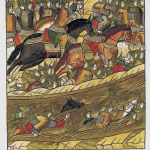1/22/2010
My argument, such as it is, is that Capitalism may be good at providing hefty benefits to the few, it’s no good at providing satisfying lives to the many. And yet it dominates the lives of people worldwide, determining what work we will be able to do, how much we will be able to afford, what things will cost, and by extension, what kind of life we will be able to make for ourselves. Capitalism is like Calvinism — it causes many things to be predestined.
As the moneys trickling down to the masses dwindles, we’re finding just how pervasive Capitalism is. Everything we do is predicated on money and since the rules that govern money in America are predicated on Capitalism, we the people are forced to apply Capitalist principles in our lives, whether they really work for us or not.
It’s true too of local governments. In one small town I know, several departments including Parking and the Utilities are run as “enterprise” funds, meaning they are supposed to turn a profit. When they don’t, the local tax hawk scolds them. But this begs the question — can there be any public property or public services if all of it has to fully earn it’s keep. Are there enough dollars to even entertain the idea of the public sector, given what things cost today?
What’s at stake is all the stuff we gave ourselves back when money bought more. The highways, bridges, and public buildings all cost money to sustain and are already supported by tax dollars. But apparently not enough tax dollars are coming in to cover these costs and then we’re left with the question — can we afford these things. And that is fundamentally stupid since most of these structures are needed so whether we can afford them or not, we have to have them. And that’s where we run up against the limits of Capitalism. In a hypothetical free market system where all organizations are run on the for-profit model, anything that doesn’t support itself and turn a profit is dead. Hence, under a free market system, parks, public buildings, public transportation, parking, utilities — all of these things would go bankrupt. They couldn’t make it because none of them would be profitable. And Police and Fire — forget about it. Unless they charged subscriptions, there would be no emergency services either.
And yet, the reason we have these things at all is because we need them. In the old days, the neighbors got together and put out the fires. They had to — there was no one else to do it. Hence, they lost a lot of homes and businesses to fire. We chose to create a public fire department to protect lives and property from the threat of fire. We could afford it then. If we cease to be able to afford it, we’ll have to go back to neighborhood brigades and accept a higher amount of property loss due to fire. It’s either/or.
A modern fire department is not a cheap operation. You have to pay full time staff, maintain specialized and expensive fire equipment, and stay up to date with the latest regulations and practices. It’s professional and effective, but it costs a lot of money.
You can play this game with any department, but if you look at it with a myopic lens, you can see that under Capitalism, there will come a time when we can no longer afford the basic necessities of civilized society. And that seems frankly ridiculous because no matter what price tag you put on the thing in question, people still need it.
But Capitalism knows no boundaries. Food is governed by it, health care, housing, education, and care of the elderly. Everything has a price tag and if you can’t afford it too bad for you.
Capitalism hits end game when most of the money has been collected by a few top players. When that happens, all the other players have to fold. And that’s the end of the game. The top players can play with each other but that’s no fun. Meanwhile, the rest of us are so tapped out we can’t even get in the game unless the big guys lend us the bucks.
But what happens to all the spent players and non-players who lost the game? Do we cease to exist? No. Do we still have basic needs? Yes. When faced with an absence of funds, do we give up on trying to provide basic needs to ourselves and families? Not as long as we’re living.
In real life, when the economy truly fails, the people go back to barter. They keep doing survival work and then trade for things. The doctor accepts a chicken. The carpenter a bag of potatoes. It’s not about monetary value — it’s about meeting needs. I need doctoring, you need food. It works ok.
Is quality of life better under Capitalism? I don’t know. In the rural France after World War II, the people lived in a barter economy. They also got state aid. But almost everyone had a tradable good or service to provide the community, and somehow they managed to get most of what they needed, including happy hour at the cafe and Sunday afternoon playing boule. It wasn’t a luxurious life they lived, but it was sufficient and satisfying and they made it themselves, in large measure. Can we say the same today?




